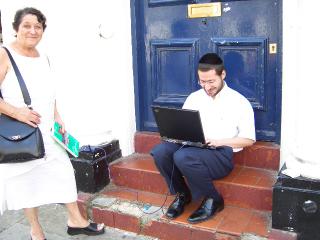I plan to use the experience of blogging a conference as part of my report for SLASA regarding the International Association of School Librarianship (IASL) conference in Hong Kong. I hope to record thoughts, new learning and ideas for future conferences or professional development activities.
Opening CeremonyThe Opening Ceremony for the 34th IASL Annual Conference was at 6.30pm on Friday, July 8 at the University of Hong Kong.
The presence and comments of Mrs. Fanny Law, Permanent Secretary for Education and Manpower for Hong Kong SAR presented a picture of a government very committed to information literacy and school librarianship: "Since 2001 all schools in Hong Kong have a school librarian". The large number of local delegates funded to attend the conference by Education and Manpower was further evidence of this support. Moral education was listed as one of the 4 priorities for HK education.
** To Do
Check out details of the Hong Kong schools bibliographic database used to enable resource sharing between schools. Other speakers included: Prof, Mark Bray, Dean, Faculty of Education HKU speaking about the university, its international focus and decision to teach in English language, and Luk Hok Hei Livesey, Hong Kong Teacher Librarian Association. Local awards were presented to 100 educators, individuals, and schools including awards for school library volunteers, student librarians and supporters of school libraries, in addition to teacher librarians.
** To Do
Check out details of the award criteria and process, and consider recognition of volunteers and student library monitors at state level.The IASL flag ceremony represented the 31 countries attending the conference, and entertainment included the Lion Dance performed by the Kowloon Technical School Chinese Boxing Club, and
'It's a Small World' in 3 languages by violinists and choristers from the Tsing Yi Trade Association Primary School. Plenty of Australians (80 delegates) to catch up with at the reception although only Pat Pledger, Pauline Crawford and Cathy Riedel (Concordia College) from South Australia located so far.
 Walking around the wall of Canterbury we came across a Global Education Centre at the back of a car park and were welcomed in. The tiny room was piled high with books, videos, kits etc looking other than the size like most Global Education centres I have known. It was great to exchange ideas and information with the co-ordinator, and there were many similarities with the situation in Australia although they receive no government funding. She had a lovely set of 5 large cloth dolls which were the result of a funding submission and were used in classroom work on cultural diversity.
Walking around the wall of Canterbury we came across a Global Education Centre at the back of a car park and were welcomed in. The tiny room was piled high with books, videos, kits etc looking other than the size like most Global Education centres I have known. It was great to exchange ideas and information with the co-ordinator, and there were many similarities with the situation in Australia although they receive no government funding. She had a lovely set of 5 large cloth dolls which were the result of a funding submission and were used in classroom work on cultural diversity.
